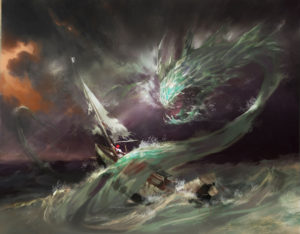I’ve decided to start posting many of our Kickstarter updates here to reach a wider audience and hopefully disperse some of the misunderstandings that seem to be making the rounds on various news sites.
1. I read in the news you’ll need additional funding beyond Kickstarter… Is this true?
It’s common practice to set Kickstarter funding goals at amounts less than what’s needed to completely realize every possible aspect of a game’s potential. Like other video game campaigns, we’ve stated that funding above and beyond the campaign goal will be used to create more content and support additional feature development. From a design perspective, if we ask for 900k but end up with 2 million USD, that would allow for expansion of the design goals and development scope. If we come in closer to 900k then we’ll develop and deliver a smaller game that fits within that budget. The design is expandable to allow for this sort of thing.
In terms of publishing deals and their ability to support continued development of our games – there are many territories in the world where we’re unable to self-publish. China is a good example. So we’d need to sign up a publishing agreement with a Chinese publisher and they’d support localization, marketing and publishing efforts in that closed market. Those kinds of deals sometime come with up-front license fees paid to the developer (that’s us) and we can use those fees to support overall improvements and ongoing development for the game. In markets where we’re able to self publish we will.
2. What is Plan B if the Kickstarter doesn’t make it?
Sometimes you have to kill your babies. For OZombie, it would mean the end of my efforts to design and develop it. I see Kickstarter as an excellent platform for testing the viability of a game concept and understanding the potential for customer demand. If the Kickstarter doesn’t make it that’s a pretty clear sign that there aren’t enough people interested in the concept to support developing, releasing and maintaining it. I want to build products that I’m excited about – and I’m very excited about OZombie – but also products that clearly excite our audience.
For our studio it means we’ll continue working on smaller, mobile/online titles like “Akaneiro: Demon Hunters†and “Hell Invaders†(this is the mobile/web title we recently signed with DeNA – not the final name of the game). I’m not as involved in the design and development of those titles, which means my day to day will focus on running the studio and our business. We can’t currently fund on our own the development of a larger single-player title like OZombie, so making that kind of game will have to wait for some future date.
3. When will we see gameplay videos? Every other Kickstarter has gameplay videos.
When we designed and planned the campaign we did so thinking a gameplay video wouldn’t be necessary. Successful campaigns from Double Fine and InXile (among others) have proven this point by pitching game concepts using only 2D artwork, basic design outlines and the track record of their development teams. And, I figured – incorrectly it seems – that saying “We’re going to make an Alice-type game set in the world of Oz†would be enough to fire people’s imaginations.
In response to feedback from backers on this topic we’ve decided to build a quick demo to show character interaction and art direction within a simple environment. Unfortunately, this sort of thing is just as likely to cause confusion and outright damage, as it is to allay people’s fears. This is one of the dangers in sharing early development efforts and “work in progress†– something we’ve seen happen repeatedly when sharing concept artwork and design exploration.
I’m hoping existing and potential backers will be able to view our efforts in context of the pressures and constraints that have shaped the final result, but you know what they say about hope.
4. How does Alice affect OZombies goals? What if you only raise $950k and part of that is “Alice†money?
That really depends on those backers who have put in money primarily to support the idea of purchasing the Alice film rights. They always have the option to remove their support – so it seems we’ll just have to cross that bridge when we get to it. In that sense it’s the backers who control the campaign and decide its fate. That’s the wonderful thing about Kickstarter.
5. Why did you sell the Alice game and film rights to begin with?
The “Alice†property was never mine because I created it while being employed by Electronic Arts. Generally speaking, when you create or invent something while working for someone else (like a corporation) that creation is automatically their property. I even signed away my name in connection with Alice – meaning EA could make another Alice game and put my name on the box, even if I were uninvolved or dead.
The film rights were first optioned, then purchased outright, by a group of independent film producers in Hollywood. Again, this was a transaction that took place between EA and those producers – I had no involvement in it and didn’t benefit directly from that sale. Why EA would sell the film rights to one of their most popular original IPs is a question you’d have to ask them.
What’s happened recently is that those film producers offered me a chance to acquire the film rights before they put them on the open market and sell them to the highest bidder. This was a kindness on their part, recognition of the fact that a property’s creator should have greater involvement in the decision making process that leads to exploitation of the property. Our mutual expectation was that fans would recognize and agree with this fact. I guess the question is – who would you rather have controlling the film rights? The concept’s creator or some faceless corporation?
If I’m unable to raise the money needed to purchase these rights then they’ll end up in someone else’s hands – who knows, maybe EA will buy them back? I wouldn’t be surprised.
6. Why not run a separate Kickstarter for the Alice film rights?
The timing simply wouldn’t work. When I received notice about the film rights I was told that there was a limited window of opportunity. Beyond a certain date the rights would go to the open market. That date would be beyond the end of the OZombie campaign, but we didn’t finalize the deal to start working with these rights until after the OZombie campaign had already started.
This is one of the reasons I’ve built “The Box†into the OZombie campaign – it’s an interesting way to announce expansion of the campaign in the event one of these deals closed during the campaign. Since we’re still working on a couple of potential surprises we can still have an interesting reveal when the box is finally opened. I’m actively working to put in place some exciting partnerships around the Alice film rights. Just hoping I can get those deals done and make meaningful announcements before time runs out.
 Continuing with a series of interviews geared towards support of our ongoing Oz Kickstarter campaign, I’ve asked designer Chris Taylor a couple of questions.
Continuing with a series of interviews geared towards support of our ongoing Oz Kickstarter campaign, I’ve asked designer Chris Taylor a couple of questions. 